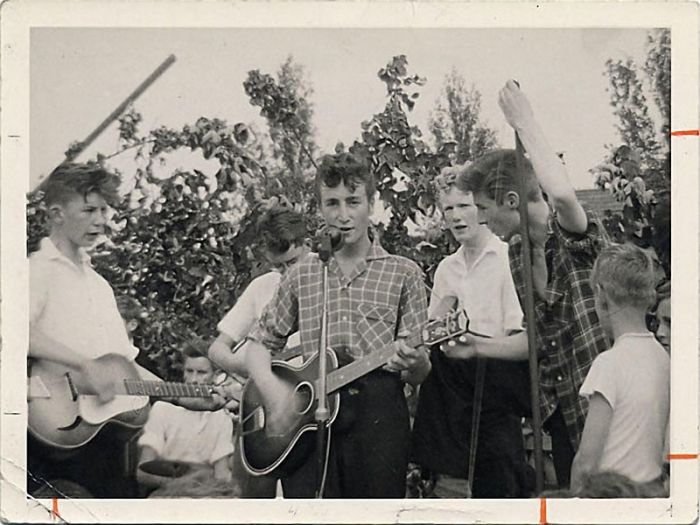|
|
History: Early Years Of The Beatles
|
Aged sixteen, John Lennon formed a skiffle group called The Quarrymen, in March 1957. Fifteen-year-old Paul McCartney joined as a guitarist after he and Lennon met that July. When McCartney in turn invited George Harrison to watch the group the following February, the fourteen-year-old joined as lead guitarist. By 1960, Lennon's schoolfriends had left the group, he had begun studies at the Liverpool College of Art and the three guitarists were playing rock and roll whenever they could get a drummer. Lennon's fellow student Stu Sutcliffe joined on bass in January. Sutcliffe suggested changing the band name to "The Beetles" as a tribute to Buddy Holly and The Crickets, and they became "The Beatals" for the first few months of the year. In May 1960 they undertook a brief tour of Scotland, as backing group for pop singer Johnny Gentle. After trying other names including "Johnny and the Moondogs", "Long John and The Beetles" and "The Silver Beatles", the band finally became "The Beatles" in August. The lack of a permanent drummer posed a problem when the group's unofficial manager, Allan Williams, arranged a resident band booking for them in Hamburg, Germany. Before the end of August they auditioned and hired Pete Best, and the five-piece band left for Hamburg four days later, contracted to club owner Bruno Koschmider, for a 48-night residency. "Hamburg in those days did not have rock 'n' roll music clubs. It had strip clubs", says Beatles biographer Philip Norman.
Bruno had the idea of bringing in rock groups to play in various clubs. They had this formula. It was a huge nonstop show, hour after hour, with a lot of people lurching in and the other lot lurching out. And the bands would play all the time to catch the passing traffic. In an American red-light district, they would call it nonstop striptease. Many of the bands that played in Hamburg were from Liverpool. ... It was an accident. Bruno went to London to look for bands. But he happened to meet a Liverpool entrepreneur in Soho, who was down in London by pure chance. And he arranged to send some bands over.
Harrison, only 17 years old in August 1960, obtained permission to stay in Hamburg by lying to the German authorities about his age. Initially placing the group at the Indra Club, Koschmider moved them to the Kaiserkeller in October after the Indra was closed down due to noise complaints. When they violated their contract by performing at The Top Ten Club, a rival venue, Koschmider reported the underage Harrison to the authorities, leading to his deportation in November. A week later, McCartney and Best were arrested for arson after they set fire to a condom nailed to a wall in their room; they were also deported. Lennon returned to Liverpool in mid-December, while Sutcliffe remained in Hamburg with his new German fiancée, Astrid Kirchherr, for another month. Kirchherr took the first professional photos of the group and cut Sutcliffe's hair in the German "exi" (existentialist) style of the time, a look later adopted by the other Beatles.
During the next two years, the group were resident for further periods in Hamburg. They used Preludin both recreationally and to maintain their energy through all-night performances. When Sutcliffe decided to leave the band in early 1961 and resume his art studies in Germany, McCartney took up the bass. German producer Bert Kaempfert contracted what was now a four-piece to act as Tony Sheridan's backing band on a series of recordings. Credited to "Tony Sheridan & The Beat Brothers", the single "My Bonnie", recorded in June and released four months later, reached number 32 on the Musikmarkt chart. The Beatles were also becoming more popular back home in Liverpool. During one of the band's frequent appearances there at the Cavern Club, they encountered Brian Epstein, a local record store owner and music columnist. When the band appointed Epstein manager in January 1962, Kaempfert agreed to release them from the German record contract. After Decca Records rejected the band with the comment "Guitar groups are on the way out, Mr. Epstein", George Martin signed the group to EMI's Parlophone label. News of a tragedy greeted them on their return to Hamburg in April. Meeting them at the airport, a stricken Kirchherr told them of Sutcliffe's death from a brain haemorrhage.
|
|









